Wellness • 03/07/2024
The Best Vitamins for Women in Their 20s

Revivalist is a reader-supported endeavor and our posts may contain affiliate links. When you buy through links on our site, we may earn an affiliate commission.
Health trends are constantly changing, but some can have long-term benefits. As you age, your body needs more nutritional support to achieve your desired health goals. Improving your diet or adding vitamin supplements can help with that.
These are the best vitamins for women in their 20s who want to improve their wellness. Think about how you want your health to change to pinpoint the best vitamins for your new routine.
1. Vitamin C
Everyone needs vitamin C to improve their body’s ability to heal and manage blood vessel dilation. You’d typically get that through your diet, but you may need more of it as your body ages.
Given that 44% of women have high blood pressure by middle age, getting more vitamin C can reduce the odds of developing. It keeps your vessels and cells healthy so it’s easier to regulate your blood pressure.
Sources of Vitamin C
Vitamin C is found in many fruits and vegetables, including citrus, peppers, strawberries, broccoli, Brussels sprouts and potatoes. Adults should have 40 mg of vitamin C a day, which can be achieved easily through a healthy diet.
You can also take a vitamin C supplement for an extra boost. Many people like to take a supplement during cold and flu season for added immune system support. You can add vitamin C powder to a glass of water or take a tablet.
Emergen-C Vitamin C Powder: $22.71 on Amazon
Nature Made Vitamin C Supplement Tablets: $9.50 on Amazon
2. Calcium
Your muscles and bones won’t start weakening until long after menopause, but it’s still one of the best vitamins for women in their 20s. Your body can use it to regulate your muscle strength and even protect against diabetes, but only if you get enough of it daily.
Consider adding more calcium to your routine by drinking milk, eating cheese and consuming leafy greens. You can always look into IV therapy if you can’t do that. A quick session will improve your nutrient absorption and give you the exact amount of recommended vitamins for your age and health needs.
Sources of Calcium
Dairy products are the most well known sources of calcium, including milk, yogurt and cheese. But if you’re dairy free, there are plenty of other options, including milk alternatives (soy, almond and rice), spinach, collard greens, bok choy, kale, tofu, sardines and salmon.
For an added boost, you can take calcium supplements.
Nature’s Bounty Calcium Tablets: $12.29 on Amazon
3. Vitamin B
Vitamin B has many health benefits for people of all ages, like strengthening your eyesight and regulating your hormones. More hormonal control is especially helpful as you enter your twenties and experience life milestones like getting pregnant.
You can add vitamin B supplements to your self-care routine to nurture your body’s comprehensive needs and create an overall approach to better wellness. Talk with your doctor about also getting vitamin B from sources like seafood, nuts and eggs.
Sources of Vitamin B
Vitamin B is found in many foods, including salmon, leafy greens, eggs, milk, meat and beans. A well-rounded diet can provide the right amount, but people on restrictive diets could develop a deficiency.
If you don’t eat meat or fish, consider taking a vitamin B supplement.
Nature’s Bounty Super B-Complex Tablets: $11.90 on Amazon
4. Iron
If you plan on becoming pregnant before turning 30, you may want to add more iron to your diet. Along with providing energy during times of blood loss like your menstrual period, it can lead to a healthier, easier delivery.
Pregnant women who increased their iron intake experienced healthier full-term pregnancies compared to women with iron deficiencies during their pregnancies. That’s because it improves the fetus’s health while supporting each mother’s digestive tract and immune system.
Sources of Iron
Iron can be found in the following foods: red meat, beans, nuts, dried fruit and fortified cereals. Women should get 14.8 mg of iron a day.
If you have heavy periods, you may consider taking an iron supplement.
MegaFood Iron Supplement Tablets: $13.49 on Amazon
5. Folic Acid
Sometimes people get folic acid and folate confused. Folate is a general turn that encompasses every form of vitamin B, but folic acid is a synthesized version of vitamin B.
You’ll enjoy a decreased risk of hypothyroidism by getting more folic acid in your diet through foods like broccoli, eggs and kale. Your cells will better divide and function, leading to better regulation of the thyroid. When your thyroid can produce hormones more efficiently, you’ll have better energy and bowel movements that could become complicated by age.
Sources of Folic Acid
Many foods are high in folic acid, including beans, asparagus, eggs, leafy greens, beets, citrus, Brussels sprouts, broccoli, nuts, bananas, avocados and fortified grains.
Folic acid supplements may be beneficial for women who are pregnant or planning to become pregnant.
Nature Made Folic Acide Tablets: $6.22 on Amazon
Vitamins for Women in Their 20s
Now that you’ve read about the best vitamins for women in their 20s, discuss your options with your doctor. You’ll create a newly revised healthcare plan that gives you all the vitamins your body needs as you experience the next decade of your life and prepare for the coming years.
Subscribe to Our Weekly Newsletter
We would love to connect deeper with you!


